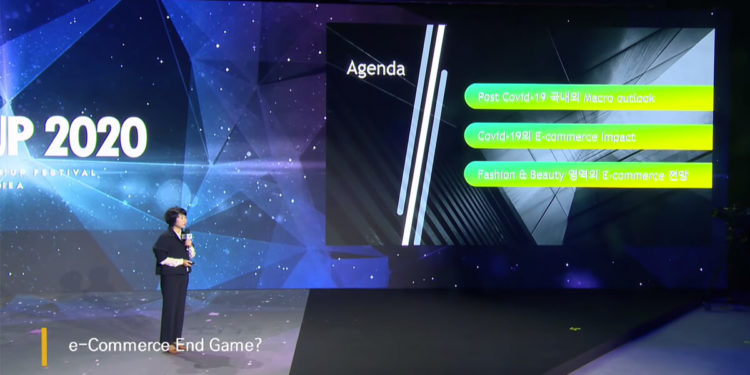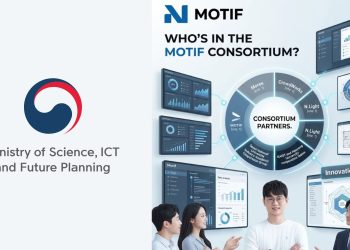The Ministry of SMEs and Startups successfully launched this year’s biggest startup festival in South Korea, the COMEUP 2020, from November 19-21. The three-day event aims to connect startups and business ventures under the theme “Meet the Future – Post Pandemic.”
The last day of the event featured the future of industries such as entertainment, especially K-Pop, online education, e-commerce, and retail (offline) post-COVID-19 era.
Commerce: E-Commerce End Game?
Electronic commerce or E-commerce denotes the transactions and activities accomplished via the internet through an online platform. It also refers to people buying or selling products and engaging in other activities through online services. E-commerce became an essential part of our lives amid the COVID-19 pandemic when people shopped for their basic needs through commercial online sites.
During the third day of the COMEUP 2020, Yeon Hee delivered a keynote speech entitled “e-Commerce End Game?”

Yeon Hee Kim became the first female partner and director in a global consulting firm, the Boston Consulting Group, in January 2009. Ms. Kim has over 29 years of consulting experience in organization, leadership, transformation, and change management design.
Kim works as a columnist and advisor in the business press, with topics about consumer products, marketing, talent management, and growth strategy.
In her lecture, she discussed the role of startups and venture companies in the recovery of economies. She stressed three points in her lecture: the Post COVID-19 Macro Outlook, COVID-19 E-Commerce Impact, and Fashion and Beauty.
Since the start of the COVID-19 pandemic, many countries suffered economic problems in all aspects and industries, including retail sales, food and beverage, and fashion. The introduction of vaccines for COVID-19 would happen only by the middle of next year, which would dictate the recovery rate of a country. Additionally, she advised that countries should now lessen restrictions to stir up their economies to start the recovery process.
Need for Variety
E-Commerce would bring a significant impact during this pandemic. Many products would show up in the online market. Content commerce or the selling of information, not just products, would also increase. The online market consists of three types: household and daily necessities, fresh food market, and user involvement market.
The need to have a variety and assortment of products, competitive pricing, and convenience would determine an e-commerce industry’s success. Social media plays a big part in differentiating the customer’s experience and push the customer to complete the transaction.
Some fashion industries would thrive depending on their products in the online setting. On the other hand, beauty industries remain stagnant. The nature of distribution would also change a lot.
COVID-19 pandemic clearly affected e-commerce, which includes limited innovation concepts. Ms. Kim said to fix the limitations, there is a need to accelerate innovation through external startups rather than internal innovations. Innovation through startups should accelerate for both the existing players and the distribution industry in Korea.
Panel Discussion: E-Commerce in the Post-COVID Era
The panelists for this discussion included Jung Min Seo, CEO of Brandi, online design platform Hanna Kim, CEO of Korea’s first live commerce platform Grip, and Sang Hyun Ju, CEO of Yam Table, online commerce of fishery products. Yeon Hee Kim moderated the panel discussion on the future of e-commerce.
The panelists introduced themselves and talked about their e-commerce business’ status during the pandemic.

Jung Min Seo stated that understanding the consumer’s consumption pattern based on AI would suggest implementing a product. Jung Min also said that the data gathered through machine learning affects the recommendations of products suitable to consumers.
Hanna Kim said that her company offers non-face-to-face retail trading through live commerce. A lot of offline brands and online brands now comprise her platform through live selling.
Sang Hyun Ju said that the importance of e-commerce business in fishery products maintains quality and freshness.
The panel discussed challenges in the business and how to keep up with those challenges amid the pandemic. The panel suggested that startups choose the sector they know the best, dream and execute their vision, and apply innovation.
Panel Discussion:
A video recording with Josh Choi, Director of Business Development at the Korea Startup Forum as moderator, showed the second-panel discussion under the ‘e-commerce’ theme. The panelists included Danit Peleg, a Fashion Designer known for her 3D printed fashion work, and Alberto Rizzoli, CEO and Co-Founder of V7, an AI platform to create the sense of sight.

The panelists presented their products and specialties through the video conference. Danit discussed the digital revolution in the fashion industry. She said that 3D printing fashion enables people to create their clothes at home. 3D printing allows no inventory stocks and no shipping costs needed for purchasing. She dreams of making something digital into physical in terms of fashion.
Alberto discussed the importance of how vision or sense of sight could give a rich consumer experience through AI technologies. Albert explained that the aim of V7 deals with Visual Perception and Human –Object Interaction. The AI used for his projects collects data from people’s behavior and movements and then applied to machines used in different sectors.
E-commerce would make the consumer experience more personal and more enriching in the future. Both the panelists agreed on making fashion more sustainable and environmentally friendly. Businesses should protect personal privacy and understand people’s behavior, and have balanced development in any field.







